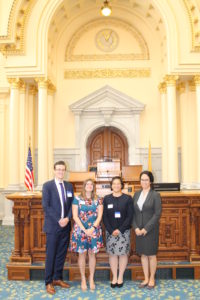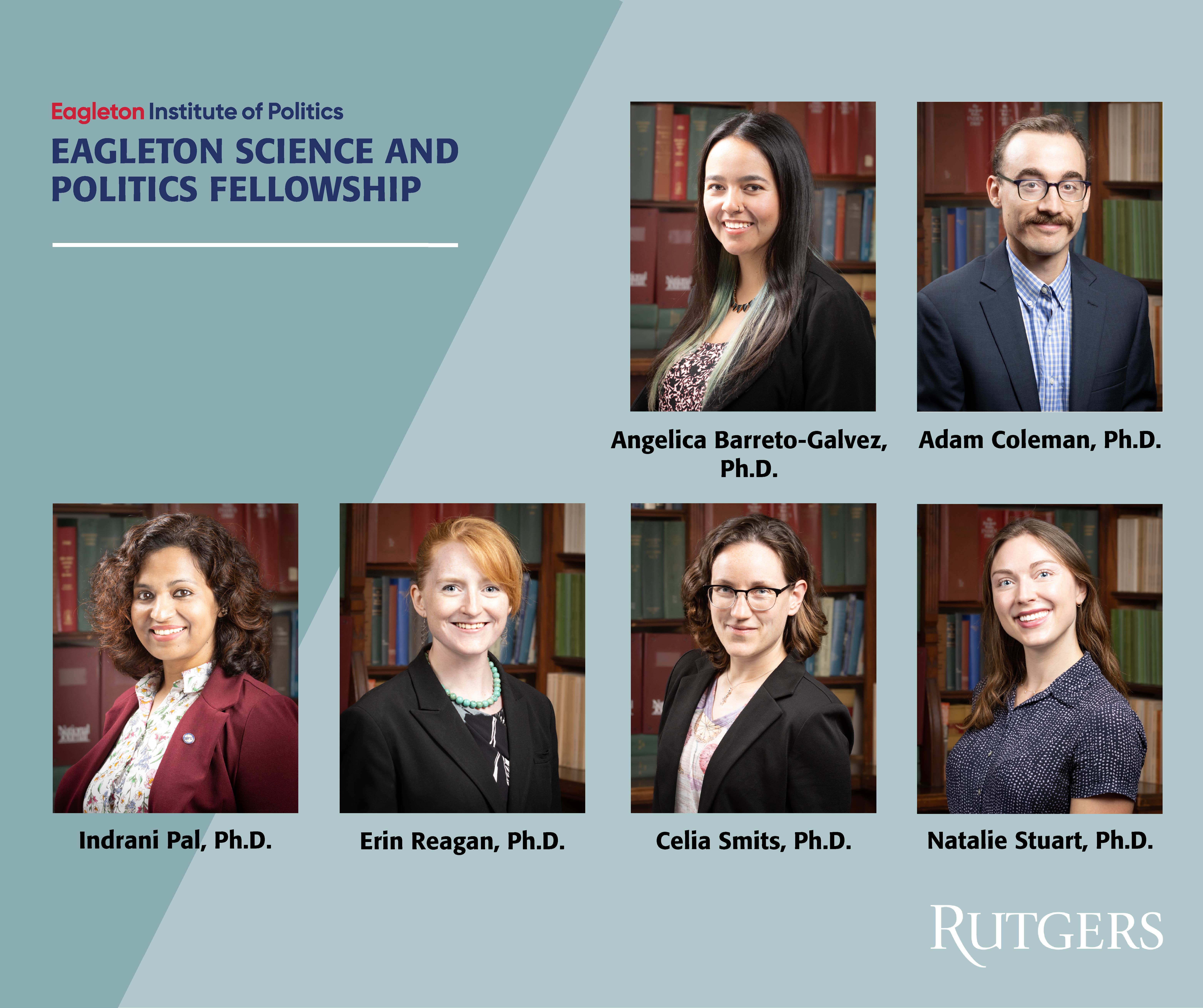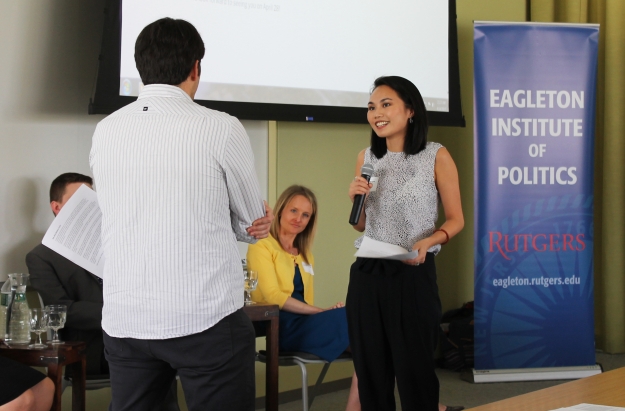Eagleton Science and Politics Program
Utilize your scientific training to help inform policy decisions in New Jersey. Join the Eagleton Science and Policy Program’s one-year fellowship for Ph.D. scientists.
The Program’s annual workshop series welcomes graduate students, post-docs, and faculty, providing a unique platform for them to learn and network.
The Eagleton Science and Politics Program, in collaboration with the Rita Allen Foundation, is seeking applications for a Civic Science Fellow, an 18-month position aimed at producing comprehensive guidelines and best practices on artificial intelligence (AI) and machine learning regulation for state-level legislators, bridging the gap between science and politics with a focus on equity, society, and policymaking. Learn More
Information about Eagleton Science and Politics Fellowship, a 12-month program for doctoral-level scientists, engineers, and healthcare professionals to serve as science advisors in NJ state government, is below.
Eagleton Science and Politics Fellowship

The Eagleton Science and Politics Fellowship offers Ph.D.-level scientists and engineers the opportunity to apply their training and expertise to the development and implementation of relevant state policy. As full-time aides in the executive or legislative branch, Science Fellows bring their advanced technical skills to service in state government.
During the one-year program, Science Fellows participate in the political process and support New Jersey state government officials in making evidence-based decisions in public policy areas involving science, engineering, and technology. Through this work, they develop an understanding of state government and learn how to build careers in public service.
The program begins with an intensive summer training seminar focused on New Jersey state politics and government, covering topics such as effective communication strategies, power structures, and political processes. Throughout the year, Science Fellows participate in professional development and networking sessions organized by the Institute.
“I have learned so much about civil service during my time at Eagleton. I know that I can take this invaluable experience with me as I move forward with my career.”
– Allison McCague, 2020 Eagleton Science Fellow
Overview
The Eagleton Science and Politics Fellowship is a year-long, full-time fellowship for doctoral-level scientists, engineers, and healthcare professionals in New Jersey state government.
Applications for the 2024/2025 year are now open. APPLY NOW
Join the Fellowship email list to receive notifications about the Fellowship cycle and related events.
Requirements
1) Ph. D. or equivalent doctoral professional degree earned by July 1stof the fellowship year in natural sciences, engineering or healthcare. For examples see FAQ.
2) U.S. citizenship OR a suitable immigration status for non-residents to work in the U.S.
Rutgers University faculty, staff, and postdocs, as well as applicants from across the country and at all stages of their careers are encouraged to apply.
Timeline
- Applications open: December 4th, 2023
- Priority Deadline: March 17th, 2024
- Video interviews for selected applicants: March-May 2024
- Registration closes: May 31, 2024 (after Priority Deadline, applications are reviewed on a space-available basis)
- Final candidate notification: May 2024
- Pre-placement orientation and training: July 15, 2024
- Fellowship begins: August 2024
- Fellowship ends: July 14, 2025
Making an Impact
The Fellowship offers three tracks:
Climate Action Track – executive placement with a project specifically focused on climate-related issues in New Jersey including clean energy, energy storage, resiliency, or sustainability.
Executive Track – placement in one of New Jersey’s executive departments and agencies, including Departments of Health; Human Services; Children and Families; Transportation; Education; Environmental Protection, and others. A Science Fellow in this track may also work on climate-related topics.
Legislative Track – placement in one of New Jersey’s four partisan legislative offices: the Democratic or Republican staff in the State Senate or State Assembly.
“I believe I have the opportunity to make a real impact with my work, which is both meaningful to me and exciting.”
– Liana Vaccari, 2020 Eagleton Science Fellow
Current Science Fellows

Past Science Fellows
Saadia Chaudrhy, Ph.D.
Purdue University – Organic Chemistry
Placement: Board of Public Utilities
Christina Marie Hernandez, Ph.D.
Rutgers University – Biomedical Sciences
Placement: Department of Agriculture
Dayna Mercadante, Ph.D.
Worcester Polytechnic Institute – Bioinformatics and Computational Biology
Placement: New Jersey Legislature
Allison Meyers, Ph.D.
Wake Forest School of Medicine — Molecular and Cellular Biosciences
Placement: New Jersey Legislature
Aidan Preston, Ph.D.
University of Utah — Cancer Biology
Placement: Department of Environmental Protection
Krista Connelly, Ph.D.
Temple University – Neuroscience
Placement: NJ Department of Corrections: Mental Health Services; Psychiatry & Addiction
Virginia Folgado Marco, Ph.D.
Albert Einstein College of Medicine – Biomedical Sciences
Placement: NJ Office of Innovation – COVID19 Contact Tracing; Digital Data Modernization
Peter Frank, Ph.D.
University of New Hampshire – Organic Chemistry
Placement: NJ Department of Education – Division of Academics and Performance; Learning Loss; Virtual Learning; Science Education Standards
Joseph Gurrentz, Ph.D.
University of Texas at Austin – Inorganic Chemistry
Placement: Senate Majority Office
Jesse Kolodin, Ph.D.
Montclair State University – Environmental Science and Management
Placement: NJ Department of Banking and Insurance – Catastrophe Planning Response Program; Property & Casualty; Homeowner Market & Coastal Restrictions
Federica Lari, Ph.D
University of Oxford – Cancer Biology
Placement: NJ Department of Environmental Protection – Bureaus of Sustainability and Climate Change & Clean Energy
Kira Lawrence, Ph.D.
Lafayette College – John H Markel Professor of Geology
Placement: NJ Board of Public Utilities – Offshore Wind; Energy Storage; Wave and Tidal Energy; Grid Modernization
Shin-Yi Lin, Ph.D.
Princeton University – Molecular Biology and Neuroscience
Placement: Department of Human Services – NJ Medicaid; Maternal and Infant Health
Andrew McAllister, Ph.D.
University of Michigan – Applied Physics
Placement: Assembly Majority Office – Committees: Telecommunications and Utilities; Science, Innovation, and Technology
Allison McCague, Ph.D.
Johns Hopkins University – Human Genetics
Placement: Department of Health – Newborn Screening Program; Office of Policy & Legislative Services
Ian McLaughlin, Ph.D.
University of Pennsylvania – Neuroscience
Placement: Assembly Majority Office
Gabriel Moore, Ph.D.
Princeton University – Molecular Biology
Placement: NJ Department of Health – Office of Multicultural Health
Sawyer Morgan, Ph.D
University of Washington – Chemical Engineering
Placement: NJ Board of Utilities – Clean Energy Division: Solar Energy, Energy Storage, Electric Vehicles
Evvan Morton, Ph.D.
Arizona State University – Civil, Environmental, and Sustainable Engineering
Placement: Senate Majority Office
Mai Nguyen, Ph.D.
Princeton University – Psychology
Placement: NJ Department of Children and Families
Hanna Sherrill, Ph.D.
Brown University – Neuroscience
Placement: NJ Department of Health – NJ COVID Mobile App Development; NJ COVID State Response Team
Liana Vaccari, Ph.D.
University of Pennsylvania – Chemical Engineering
Placement: Department of Transportation – Climate Resiliency of Transportation Assets
Zixuan Wang, Ph.D.
University of Michigan – Chemical Engineering
Placement: Assembly Majority Office – Committees: Environment and Solid Waste, Telecommunication and Utilities, Education, Natural Resources and Infrastructure
Fellowship FAQs
What level of education do I need to be eligible for the Fellowship?
Fellows must possess a Ph.D. or equivalent level doctoral degree in natural sciences, engineering, or healthcare. Individuals must complete all doctoral program requirements by July 1 of their program year.
What are examples of acceptable natural science disciplines?
Examples include, but are not limited to:
- Agricultural Sciences
- Animal Sciences
- Biological and Physical Sciences
- Computer and Information Sciences
- Chemistry
- Earth, Ocean and Marine Sciences
- Education
- Engineering: Biomedical, Ceramic, Chemical, Civil, Electrical, Mechanical, Nuclear
- Environmental Sciences
- Food and Nutritional Sciences
- Health Sciences/Medicine
- Mathematics/Statistics
- Psychology
- Systems Sciences
What Ph.D. equivalent degrees are accepted?
Examples of PhD equivalent degrees include, but are not limited to:
- Medicine and Veterinary Medicine (MD, DO, DVM)
- Pharmacy (PharmD)
- Dentistry (DMD, DDS)
- Nursing (DNP)
Is the Fellowship limited to New Jersey residents?
No, all eligible applicants are encouraged to apply. However, residency within a reasonable commuting distance to the host office (Trenton, NJ) and the Eagleton Institute (New Brunswick, NJ) is required throughout the Fellowship. The program is not able to offer relocation reimbursement or housing assistance at this time.
Do I need to be a U.S citizen?
You do not need to be a U.S. citizen to apply. Non-residents must have suitable immigration status to work in the U.S.
Do I need to have previous experience in public policy?
No, Science Fellows are not expected to have previous experience. However, they are expected to be interested in the processes of American politics and government, and they should understand value of scientific expertise in political and governmental spheres.
All selected Science Fellows will participate in a one-week seminar before their placements, gaining intensive training in New Jersey political structure as well as government and legislative processes.
Is the Fellowship only for early-career scientists?
No, applicants with all ranges of experience and at all stages of their careers may apply. Fellowship alumni include mid-career scientists, faculty members on a sabbatical, as well as recent Ph.D. graduates and postdoctoral researchers.
Will I receive a stipend?
The yearly stipend will be $60,000, paid bi-weekly starting in July. The stipend is taxable as income, but no federal or state taxes will be withheld. Science Fellows will be responsible for reporting the income and determining tax liability.
Will I receive health benefits?
Health, dental, and vision insurance is provided for the Science Fellow as part of the benefit package with additional coverage for spouses and dependents available for purchase. Visit the University Health Plans website for more information on health insurance benefits.
Are there other benefits?
- 15 ‘flex’ days to use as sick and holiday time in addition to State-observed holidays.
- Professional development funds up to $1,500 for conference travel and registration.
- Mentorships, professional development and networking sessions organized by the Institute.
- Rutgers University resources, including access to over 20 libraries, extensive subscriptions to databases through PubMed, gym and recreation programs, and year-round university-wide events.
Will you help me find a placement?
Yes, Science Fellows will be matched with appropriate and interested state offices. The interview finalists will be presented with a list of available placements and projects per their track selection. In addition, individually tailored placements outside of this list are possible as well. The finalists, the Fellowship leadership, and the host office remain in conversation throughout the process which culminates with a virtual or in-person meeting of the finalist with the host office.
What are the Fellowship policies regarding in-person, hybrid, or virtual-only placements?
Placements are based in or around Trenton, New Jersey. Science Fellows will become part of project teams which will have separate requirements or expectations on working policies based on the host office. There are in-person monthly meetings, networking events, and optional lectures at the Eagleton Insitute on the Rutgers New Brunswick campus.
We are unable to secure placements with specific advanced knowledge of whether the Science Fellow would be working fully in-person or virtually or somewhere in between. Such arrangements become clearer in May, after a placement has been selected, and the final candidates have met with their potential supervisors. Historically, legislative placements have been fully in-person, while executive placements have varied.
Can I keep another full-time appointment in addition to the Fellowship?
No, all selected Science Fellows are expected to dedicate a full-time schedule to the Fellowship and may not keep outside full-time appointments. Moreover, individual office working hours may vary and may include some evenings, and possibly weekends.
What are some of the components of the Fellows’ year-long experience, aside from their primary responsibilities in their host offices?
Throughout the year, the Science Fellows participate in monthly meetings with the Fellowship leadership, Eagleton Institute events, and many professional development/mentorship opportunities, drawing from the Institute’s rich network of alumni, and government, non-profit and business contacts. Fellows are encouraged to discuss their work and fellowship experience at outreach events.
What kind of careers do the Science Fellows pursue after the Fellowship?
Many of the Eagleton Science and Politics Fellowship alumni have been hired by their original host offices and remain working there. Other Science Fellows have pursued federal-level fellowships or joined non-profit research and trade organizations as policy analysts, program officers, or government affairs executives. Fellows have gone on to full-time positions in the U.S. Departments of Energy and Homeland Security, National Human Genome Research Institute, Dana-Farber Cancer Institute, and others.
What else should I know about the Fellowship?
All Science Fellows are expected to fulfill their mission as trusted sources of fact-supported and unbiased scientific knowledge while also holding in confidence any information or material required or suggested by their host office. Your work might be relevant to your specific expertise, but it is more likely that you will work on a variety of issues relevant to the hosting office’s interests. Furthermore, your role might be individually further defined by your hosting office and you might not work on science-related issues at all times.
For More Information
For more information about the Fellowship and application process, please contact Anna Dulencin, Ph.D., Director, Eagleton Science and Politics Program.
Eagleton Science and Politics Workshop
The Eagleton Science and Politics Workshop (ESPW) is a collaborative initiative that enables graduate students, post-docs, and faculty to explore intersections between science and politics in order to increase their understanding of how politics affects their disciplines and how they can effectively engage with political and policymaking leaders and institutions.
The workshop series aims to make connections and improve communication between scientists and policy-makers, as well as to expand the pool of scientifically trained graduates interested in public service careers.

“The science workshop has changed my career path.”
– Rutgers Graduate Student
Partners
The Eagleton Science and Politics Workshop is offered in collaboration with the following partners (list in formation):
- The Boggs Center on Developmental Disabilities, Rutgers Robert Wood Johnson Medical School, Rutgers Biomedical & Health Sciences
- Departments of Neuroscience & Cell Biology and Pediatrics, Rutgers Robert Wood Johnson Medical School
- Division of Life Sciences
- Edward J. Bloustein School of Planning and Public Policy
- Graduate School-New Brunswick
- Institute of Earth, Ocean, and Atmospheric Sciences
- Office of the Executive Dean, Rutgers School of Environmental and Biological Sciences
- The Office for the Promotion of Women in Science, Engineering and Mathematics (SciWomen)
- The Rutgers University iJOBS Program, funded by a Broadening Experiences in Scientific Training grant from the NIH
- Science and Policy and Advocacy at Rutgers (SPAR), a graduate student organization
Past Workshops




